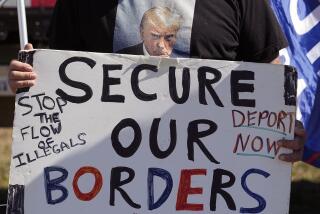Bullish on the Bear : Investors Regaining Faith in Russia, Its Officials Say
- Share via
MOSCOW — The frenzied flight of capital from Russia is over. Investors have already poured more than $2 billion into Moscow’s levitating stock market. And Russia is now ready, willing and stable enough to absorb more foreign investment, Russian officials said Friday.
Foreign investment in Russian securities increased by 40% each month in July and August and should reach $1 billion a month by the year’s end, Deputy Prime Minister Anatoly B. Chubais said in an interview published in Friday’s Izvestia newspaper.
In the most tangible sign to date that citizens have regained confidence in the battered Russian economy, at least 10% of the incoming dollars are from Russian nationals. They had stashed their money in overseas bank accounts but now see greater investment opportunities back home, Chubais said.
Other economists say up to 50% of the incoming dollars are investments by Russians.
“Reforms have changed the fundamentals of society,” said Chubais, who is also Russia’s privatization minister. “Financial stability has been achieved. And if today we solve the investment problem, tomorrow everybody will be talking about the Russian economic miracle.”
This burst of official happy talk comes on the eve of a summit in Washington between President Clinton and Russian President Boris N. Yeltsin. There Yeltsin is expected to pitch Russian’s economic turnaround--and plead for more foreign capital.
Clinton intends to encourage Americans to double their investments in Russia and has arranged for Yeltsin to meet at the White House with three top executives from General Motors, Dresser Industries and U.S. West. Clinton has also asked Congress for a permanent end to Cold War-era trade restrictions, and he supports most-favored-nation status for Russia.
This week, the Russian government began openly courting both Russian and overseas investors.
While Chubais touted the success of the Russian stock market, a senior adviser to Yeltsin talked up the government’s commitment to improving the business climate at an American Chamber of Commerce luncheon.
Yevgeny G. Yasin, head of the President’s Analytical Center, spoke Friday to an audience of more than 100 dapper Western business people in the American-managed Radisson Slavyanska Hotel, where Clinton stayed when he visited Moscow in January. The economist rattled off a list of new presidential decrees he said would improve the tax status of foreign investors--and he urged American executives to sink their money into Russian factories, which so far have been left out of the investment boom.
Prime Minister Viktor S. Chernomyrdin also announced a new plan this week to devote 0.5% of Russian gross domestic product to investment in private companies that can repay the loan in two years.
The state will own 20% of each of these companies and private investors--including foreigners--will own the rest.
Still, economists remain skeptical that Russia will soon attract the long-term capital investment its ailing industrial sector desperately needs.
Without such capital, the Russian nationalist nightmare could come true: With obsolete factories bankrupted by cheaper and better imports, Russia would be reduced to being a Third World supplier of raw materials to the West.
Many Russians are extremely wary of foreign investment--particularly the kind of investments that foreigners want to make, said Clifford Gaddy, an economist who studies Russian defense conversion at the Brookings Institution in Washington.
They fear that “foreigners are going to buy up all the good stuff--oil, gas, lumber, metals,” Gaddy said, that “they’re going to ship all that stuff out of Russia and use it in their own industry, and sell it back to Russia in the form of a Sony TV.”
Most of the new investors are pension funds and other giant institutions with so many billions of dollars under their management that they can afford to risk a tiny percentage in Russia’s wildly unregulated securities markets, Gaddy said. And, of course, they are mainly buying shares of privatizing companies that have rights to oil, gas, timber, metals and other raw materials.
So far, they’ve been making a killing. The new Moscow Times Index of stock prices shows the market leaped 30% in the past 22 days. (The index tracks the over-the-counter price of 30 Russian stocks. The base of the index is the total market capitalization of the 30 companies on Sept. 1.) Even with a Russian inflation rate estimated at 6% this month, that return puts the Dow Jones to shame.
Investors must have steel stomachs. The ruble plummeted 5% against the dollar in a single day Thursday. Russia has no equivalent of the Securities and Exchange Commission, no disclosure laws, an underworld that is financially astute and no enforceable legal guarantees for investors.
But the profits are irresistible. “The fastest money in the world is now being made in Russia,” said Izvestia economics columnist Mikhail Berger. “Everybody realizes that this kind of chance comes only once in 100 years.”
New Index Soars
The Moscow Times has launched the TM index, based on the over-the-counter price of 30 Russian stocks. The base of the index is the total capitalization of the 30 companies on Sept. 1. The total values of the index has risen 30% since the first of the month, when it started.
Sept. 1, 1994=100
Sept. 22: 129.92
Source: Moscow Times
More to Read
Sign up for Essential California
The most important California stories and recommendations in your inbox every morning.
You may occasionally receive promotional content from the Los Angeles Times.










